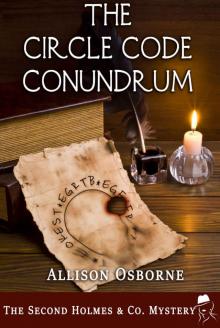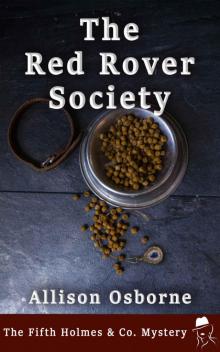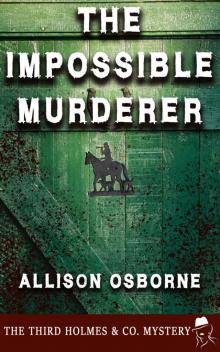- Home
- Allison Osborne
The Circle Code Conundrum Page 3
The Circle Code Conundrum Read online
Page 3
A Study of Codes and Cyphers by Sherlock Holmes
He stared at the book for a long while, debating if he should add it to his pile. If anyone could help solve their mystery, Irene’s father could, but Joe worried that seeing this book might upset her. Perhaps he would borrow it and read it himself and see what relevant information the contents provided, if any.
✽✽✽
Joe returned to 221B, clutching his books and papers under his jacket to keep them dry. Irene still stood in front of the board, several empty cups of tea on the table.
“Any progress?” Joe asked, shutting the door with his foot.
“Some,” she said. “But they are mostly theories about which letters are which. How did you make out?”
“Decently,” he said.
She turned and saw the stack in his hands. “What are all those?”
“Novels,” he said, turning away from her and setting the pile on the table. He’d hoped to hide the spines from her, but her keen eyes were too fast for him. Before he had a chance to tuck her father’s book back in his jacket, she was beside him, poking through the novels.
“What’s this one?” She asked, grabbing at the blue spine.
He clutched the books tightly, but her tough little fingers wedged the small book from his hands.
“I saw it,” Joe stammered, words stumbling over one another. “Thought it might be...useful.”
Irene read the title, then slowly walked to the couch. She sunk into the cushions, eyes locked on the small blue book.
Nervous beads of sweat appeared on Joe’s brow and he wiped them away as he sat on his own seat. He tried to gauge her reaction, but all she did was stare. She ran her fingers gently over the title, then her father's name.
“Irene,” Joe said. “I’m sorry.”
She finally looked at him and he tried to read any emotion in her eyes, but none came. “Why are you apologizing?”
“You’ve only recently started speaking about him more,” Joe said. “And I didn’t want to upset you.”
Irene wasn’t listening. A small smile tugged at her lips as some memory swept over her.
“My father would often ask people,” she said, eyes glued to the book again. “If they’d ever read his manuscripts on cigar ash, cyphers, poisons, and he knew the answer would always be no. When he would be told no, he’d sigh, disappointed, as if they were the only person in the world who hadn’t read his work. Deep down, he knew no one read those things he published. They read his stories written by my uncle, but he didn’t care about those numbers. Every few months he would wander into the library and ask to see how many people had borrowed or read one of his published works. I could always tell when that number rose because he’d come home with a small cake from the bakeshop.”
She kept staring at the book, her dark hair falling around her face. She touched her father’s name once more, then held the book out to Joe.
“Read it,” she said. “See if it offers any insight into our puzzle. But first, come see what I’ve written.”
He took the book from her and set it on his little table, then turned his attention to the board. Below the first messages were Irene’s translation of the code written on Mr. Grouper’s shed:
NGX*QKT*DOFT*QFR*O*VOSS*IQCT*NGX
___ A__ _I__ A__ I _I__ _A__ ___
“These two words,” she said. “Must have a vowel somewhere. And, there is a set of double letters, here. Could be ‘EE’ or ‘TT’. But they are different than the set of doubles from the first message.”
Joe looked at the jumble of letters. She'd made progress, but the letters were nowhere near resembling a coherent sentence. Irene let out a sigh and fell backwards onto the couch, legs dangling over the armrest.
“Read those papers you’ve brought out loud Joe,” she said, closing her eyes. “And I shall listen for anything of importance. Times like these I wish I still smoked.”
Joe took his bundle of papers and spread them out over the dining room table. “I’m glad you don’t smoke. My lungs do not like cigarettes, no matter how much I wanted them to.”
About half an hour later, Joe finally found a small article from the March Sixteenth edition of the Petworth Post. He stood, papers falling from his lap, scattering on the floor. Folding the paper to isolate the article, he hurried to the couch. Irene still laid on her back, so he sat on the floor, cross-legged, matching her height.
“I found something,” he said.
She opened her eyes and looked at him. “Read on.”
Joe skimmed the article again, paraphrasing out loud.
“A horrific car crash the morning of the fifteenth,” he said. “Just outside Petworth. Brakes failed, the car went into the ditch, then caught fire. No one claimed the car, and there is a phone number to call if anyone knew who the car belonged to. That is the only thing I can find that might affect someone. There weren’t any other happenings that week. I even thought about weddings, funerals, anything positive or negative that would cause someone upset.”
Irene took the paper and held it up, skimming the article for herself.
“Nothing about recovering a body?” Irene asked.
“No,” Joe said. “That information would be in the police reports I assume.”
Irene sat up, grinning. “Then we shall have a policeman find us that report.”
Chapter III
Decoding a Difficult Cypher
Irene rocked back and forth in Eddy’s chair behind his desk. Scotland Yard was busy with constables scurrying here and there. They ignored Joe as he leaned back on the desk, arms folded, looking every bit the detective inspector himself, save for the jacket over his arm instead of hanging on the back of his chair.
Irene drew attention, however, but she wasn’t bothered. She’d been here enough times that she knew most of the constables and inspectors, and they knew her. She kept eyeing the shiny red apple next to Eddy’s coffee mug. If he didn’t hurry with that report, she’d take the apple for herself.
They’d pleaded with Eddy to get them the police report and after a promise to return the report back quickly, he’d trudged away for the archives.
“Did you two get arrested?”
Thom Gregory laughed as he approached them. Dressed up well enough for tea with the Queen, Irene’s eyes fell upon his new shoes, bought within the week. That would make this pair number four in the past two months.
“Thought we were in a recession,” she said, nodding to his feet.
He clicked his heels together. “Must keep those designers in Paris busy.”
“You certainly do that,” she said. “We were not arrested. Eddy is just gathering a police report for us.”
Thom grumbled and bent his tall, slender body down to her. “If you’re trying to steal another report about yourself-”
“Cheeky,” Irene said. “Nothing of the sort. It’s for a rather perplexing case if you must know. Now, isn’t there some vagrant that needs arresting? Or some new coat that needs purchasing?”
He muttered a curse word at her then headed back across the precinct. Eddy passed him and saw the scowl on his face.
“You bothering my inspectors?” he asked, handing Irene a folder.
“Just a bit of friendly give and take,” she said.
“Of course,” he said. “Is this still for that man with the strange note?”
“A secret code,” Joe said. “Cyphers, jumbled letters, all pointing at a mysterious backstory of a secretive woman.”
Irene did her best to hide her smile. Joe could excite himself over the simplest of things. Eddy, however, wasn’t convinced. He raised his eyebrow as he handed Irene the folder.
“What does the report say?” Irene asked him, tucking it in her bag.
“I didn’t read it,” Eddy said. “In case you haven’t noticed, we’re up to our eyeballs in murders and assaults. The looting is still going on due to the city halting construction because of all the rain. I have actual crimes to attend to, so off you go and p
lay with your little puzzle.”
Joe looked genuinely hurt as he tugged his jacket on. Irene stood nose to nose with Eddy, swiping the apple from his desk.
“That was rude,” she said to Eddy. “So I am taking your apple. Come, Joe. We have a mystery to solve.”
She marched away from his desk, Joe on her heels. Eddy caught up to them, blocking them and holding out his hand.
“If I took something of yours every time you were rude, then I’d own all your possessions,” he said. “I am sorry. We are swamped and you draw attention every time you are in here. I need my men focused.”
Irene looked around. Several constables eyed her, some out of nerves, no doubt recalling her tenacious reputation, and some in wonder, as if she were some trophy on a shelf to be ogled. She glared at all of them.
“Fine, we will leave.” She took a big bite of the apple then dropped it in his hands.
“Why must you antagonize?” He asked.
Joe gently led Irene toward the door. “That is a mystery not easily solved. Thank you, Lestrade. Good luck with your cases.”
“And with your...puzzle.” Eddy took his own bite of the apple and turned back to his desk.
They left Scotland Yard and hurried through the rain to the bus stop. Several other people waited in the small shelter and Irene and Joe tucked in close to one another. Thunder rolled in the distance and a young girl beside them whimpered and hid behind her mother. She couldn’t have been more than seven or eight years old. Young, but old enough to remember the bombings London endured just a few years ago.
Irene struggled with thunderstorms for a short while during the war, and even now, a particularly severe one would wake her during the night, sending her heart racing in panic.
The girl peered around her mother and gave a shy smile. Irene stared back, curious as to what she was smiling at. Then she realized the girl was looking behind her. Irene turned and caught Joe crossing his eyes and pursing his lips, making a funny face to ease the girl’s fears. The bus pulled up and the girl skipped up the step, her mother in tow.
Irene and Joe found their seats and the bus jerked forward into motion. Joe ruffled his hair, dripping water into the middle aisle.
“I will have to take a picture of that face you made,” Irene said. “Then if something should ever frighten me, I can pull out the photograph.”
“And use it to make you laugh?”
“No,” she said. “To show it to whatever is frightening me and scare it back to wherever it came from.”
“You are quite rude,” Joe said, but he laughed as the bus drove along.
✽✽✽
Irene and Joe sat down to supper and dug into Miss Hudson’s potato and pea pie. As they ate, Joe skimmed the police report.
“March Fourteenth, a Thursday,” he said. “A constable patrolling on his usual route noticed smoke coming from a rather deep ditch and discovered the car. The police mechanic said the brakes failed. The car must have been going at a fairly fast speed when it crashed into the ditch. According to this, the vehicle rolled several times, crushing the body inside, making it hard to even identify the model of car. The constables arrived as the engine caught fire, burned everything beyond recognition.”
He took a big bite of pie and continued, his mouth full. “There was blood all over the car, the one constable reported. If someone had been in the car, he or she was surely dead.”
Irene jabbed her fork into the air, stopping Joe’s words and sending a pea splatting on the paper. “No report of a body?”
Joe flicked the pea off the report and flipped through the second and third page.
“No body recovered.”
Irene nodded. “Continue.”
He took another bite of pie, dropping a small bit of potato on the second page. He scooped it up and licked it off his finger, reading the last bit of report.
“The constable saw all the blood,” he said. “Right before the fire engulfed the car. They put the fire out and removed the car. Didn’t even bother to check inside, just assumed the body was crushed to a pulp and burned.”
Irene scowled. “Country bobbies and their lackadaisical crime scene procedures...”
Joe read on. “According to one constable’s account, nothing could’ve survived, not even a flea. They couldn’t find out who the car was registered to. They waited for a missing persons report, and none came, so they deemed the crash an unfortunate accident.”
Irene pushed a pea around her plate. “There was no missing persons because either the person who died wasn’t missed, or they miraculously survived.”
“Do you believe in miracles?” Joe asked.
“No.”
“Then how would someone survive?”
“How indeed.” Irene stabbed the pea and popped it into her mouth.
✽✽✽
Irene stared at the board, fingers steepled, elbows resting on her knees as she sat in her desk. Her left foot had fallen asleep, but she didn’t want to move for fear she’d lose her train of thought. The newspaper and police report had given them a narrative for Mrs. Grouper but hadn’t brought them closer to decoding the messages.
The curtains were drawn, the clock chiming midnight ages ago. From his chair, Joe yawned, mouth gaping open, his head falling back. Irene tried to ignore the yawn, but it caught her, forcing her own yawn upon her. Joe stood and stretched, setting down her father’s book.
“I need a cuppa if we’re going to continue,” he said. “You fancy one?”
Irene nodded, then Joe’s words struck her. “You.”
He turned the tap and filled the kettle. “Pardon?”
“You,” she said, then sprung to the board. “This word must be ‘you’. If I am correct, then we can fill in more. Plus, this word, with the ‘I’ as a second letter, and two of the same letters right after it, there are only a few words that would make sense with that spelling. The same goes for the first message, so with process of elimination, we can hypothesize that double letter paring as well.”
She felt tingles in her fingertips as she wrote on the board. She scratched out some letters and filled in others. By the time the kettle whistled, sweat had broken upon her forehead. She wiped her brow and stepped back, letting Joe take a look at their progress:
I _OU__ YOU __ __TTI_
YOU A__ _I__ A__ I _ILL _A__ YOU
“Oh my,” Joe said, pointing to the second message. “That could be anything from ‘kill’ to ‘will’ to ‘Bill’.”
“Look at the first message,” Irene said. “Not many words with the ‘ou’ in them. Sound, wound, found, mount.”
“I mount you?” Joe said, then sipped his tea to hide his fit of giggles.
Irene felt a smile tug at her lips. “Oh, it is too late. We’re just going to run circles around ourselves.”
“I wound you?” Joe kept trying. “Either way, I’m sure that letter is an ‘N’. What happened if we put it in?”
“But don’t you see, Joe?” Irene said. “We haven’t found a pattern to the code. We are just translating letters seemingly at random. Look at what we’ve decoded. There is no pattern.”
“Not yet,” Joe said. “Just put in ‘N’ for both of them.”
She took a big gulp of her tea and filled in the letters:
I _OUN_ YOU __ __TTI_
YOU A__ _IN_ AN_ I _ILL _A__ YOU
Joe slumped back in his seat. “I thought that would give us more.”
As Irene took another sip of tea, the telephone rang and she bumped her teeth on her teacup.
“Who’d be calling this late?” Joe said, eyeing the phone as if it would bite him if he touched the receiver.
“Someone who needs us, apparently,” Irene said, rushing to the phone. “Irene Holmes speaking.”
“There’s been another message, Miss Holmes,” Mr. Grouper’s voice hissed on the other side of the line. “A rather long one.”
“Oh, wonderful,” Irene said, grabbing the pen and paper that Joe was smart enough to
leave beside the telephone.
“Not quite,” Mr. Grouper said. “It put my wife into fits. She spilled dinner all down the front of her new dress. It’s stained the periwinkle and that agitated her even more. She is not well, Miss Holmes.”
Joe pressed his ear to the receiver, resting his arm on Irene’s shoulder to support his hunched figure.
“That’s a shame,” Irene said. “What did the message say?”
“There are two circles,” Mr. Grouper said. “One inside of another. It was pinned to our door when Henriette came home. I immediately took it down and sent it by rush courier to you, which, I should tell you, Miss Holmes, was almost impossible to find at this hour. Once I settled my wife and made sure she was in bed and asleep, I called you, knowing the note would get to you around this hour.”
As if Mr. Grouper timed it perfectly, a knock came from the door downstairs.
“On it,” Joe said, then hurried out the door.
“We’ve made a bit of a breakthrough,” Irene said. “Stay strong, Mr, Grouper. We’ll telephone in the morning with our progress. But, as I warned you before, keep your wife in the house, lock your doors, including the bedroom. For everyone’s safety.”
She hung up as Joe came through the door. He handed her the note and she pinned it to the board, revealing the third message:
“This second ring must be another sentence,” Joe said. “But where do these ones start?”
“There is a simple way to figure this out.” Irene hurried to the table and shone a light on the message. “This letter starts strong, but by this letter, the hand is shakier. One could assume that the author of this message would start nervous, then built up his confidence, but in this case, this person is very bold. He starts strong, then his hand grows weak, and his pen starts to run out of ink.”
She whisked away to the board and began writing this third message below the others, decoding it as much as she could:

 A Study in Victory Red
A Study in Victory Red The Circle Code Conundrum
The Circle Code Conundrum The Red Rover Society
The Red Rover Society The Happy Family Facade
The Happy Family Facade The Impossible Murderer
The Impossible Murderer